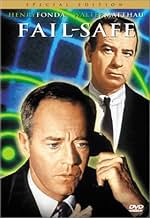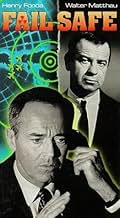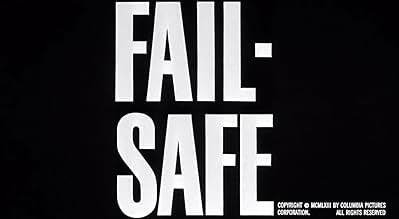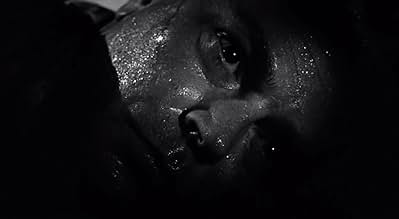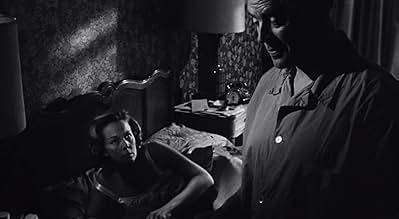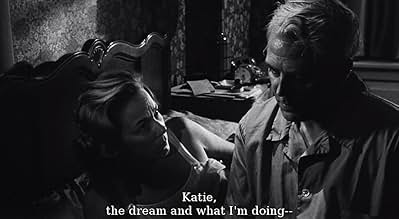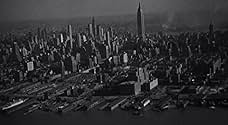IMDb RATING
8.0/10
26K
YOUR RATING
A technical malfunction sends American bombers to Moscow to deliver a nuclear attack. Can all-out war be averted?A technical malfunction sends American bombers to Moscow to deliver a nuclear attack. Can all-out war be averted?A technical malfunction sends American bombers to Moscow to deliver a nuclear attack. Can all-out war be averted?
- Nominated for 1 BAFTA Award
- 3 nominations total
Dom DeLuise
- Sgt. Collins
- (as Dom DeLouise)
Featured reviews
I'm a child of the 1970s, but this movie still scared me. You didn't have to grow up during the 50s or 60s to appreciate this. Anways in the 1980s, when Reagan was in office, nuclear war seemed a very real prospect. This movie is deadly serious, NO humor at all, and lit very sparsely. The battles between Russian and US planes seen as blips on a huge screen, is just as scary as if we had seen it realistically. Frightening, harrowing...hard to believe this film still has that effect now. Well worth watching but it's very very grim. Also, Fonda is superb as the President.
I was thoroughly in suspense throughout this magnificent film. I almost felt as if I was watching World War III unfurl like the Gulf War did on CNN, it was that convincing. Fonda as the President and Matthau as the Professor, in truly memorable performances, are superb in their roles and indeed the entire cast is strongly competent. Besides the unforgettable ending, by way of the President's unthinkable concession, are the arguments and attitudes of the Professor and Colonel Cascio. At the time it must have been very tempting to many hawks in Cold War administrations to end the deadlock whenever a seemingly decisive opening presented itself. I strongly recommend this film for its believablity and realism and even the final credits! 10/10.
I saw this movie via two instances of serendipity. First I just happened to be living in an area that offered The Disney Channel in the basic cable package (which is all I ever get) and that as a Bruce Springsteen fan I was excited that the Disney Channel was going to broadcast a special concert short on The Boss. Of course I'm an older Springsteen fan, so instead of staying up late to watch it I just put a tape in and pressed record. The next day I enjoyed the concert, but forgot to hit stop when it ended. What followed next was "Fail Safe". After a few minutes it caught my interest, and now is one of my favorite films.
I'm not sure if this was a precursor to "Strangelove" or vice versa, for they are both listed as 1964 releases. Oddly they both have the same texture about them which leads me to believe that there was more than coincidence in their respective productions. Both are piece de resistances in Cold War studies. The main sundering is that where "Strangelove" excels in parody, "Fail Safe" is rich in tension.
Of course an anxious film about nuclear war on the brink can easily invoke tension (remember "War Games"?), but this film exceeds a good plot. The filmmakers use a backdrop of soceital depravity to create neurasthenia and presentiment; as shown by the strange and erotic scene with Walter Matthau and the woman in the car (kind of a mass-sadisim, lust thing) and the implied domestic violence in the apartment scene. The movie is also deliciously philosophical (the clever "criminals and file clerks will survive" theory) as well as adroit phsycological character development for all the main characters.
The picture is also darkly filmed, remarkedly minimalist and low-budget as if to show the limits of technology, in order to symbolize the sophistry of our trust in it. BTW I love the Matthau character's (the political science professor) line as he explains the faults of missles that have no human intuition. "The rockets have the defect of their virtues" he says in explaining how they cannot make a conscious decision to abort after receiving an order. But the message in this film is clear; even if technology breaks down it is only a symptom of our doom, ultimately it is humans who are responsible.
I'm not sure if this was a precursor to "Strangelove" or vice versa, for they are both listed as 1964 releases. Oddly they both have the same texture about them which leads me to believe that there was more than coincidence in their respective productions. Both are piece de resistances in Cold War studies. The main sundering is that where "Strangelove" excels in parody, "Fail Safe" is rich in tension.
Of course an anxious film about nuclear war on the brink can easily invoke tension (remember "War Games"?), but this film exceeds a good plot. The filmmakers use a backdrop of soceital depravity to create neurasthenia and presentiment; as shown by the strange and erotic scene with Walter Matthau and the woman in the car (kind of a mass-sadisim, lust thing) and the implied domestic violence in the apartment scene. The movie is also deliciously philosophical (the clever "criminals and file clerks will survive" theory) as well as adroit phsycological character development for all the main characters.
The picture is also darkly filmed, remarkedly minimalist and low-budget as if to show the limits of technology, in order to symbolize the sophistry of our trust in it. BTW I love the Matthau character's (the political science professor) line as he explains the faults of missles that have no human intuition. "The rockets have the defect of their virtues" he says in explaining how they cannot make a conscious decision to abort after receiving an order. But the message in this film is clear; even if technology breaks down it is only a symptom of our doom, ultimately it is humans who are responsible.
The ultimate moral dilemma confronts the President of the United States when everything goes wrong with the strategic offensive power of a US Air Force bomber squadron, leaving viewers shaken at the end of a superior Cold war drama highlighted by its extraordinary claustrophobia.
Filming of Fail-Safe coincided with filming of Dr. Strangelove, and Stanley Kubrick succeeded in getting his film done first. The earlier publicity for Strangelove hurt Fail-Safe's exposure, and this is doubly disappointing because Fail-Safe is in most ways a superior film, telling its story straight and highlighting superior performances by the entirety of the cast, from Henry Fonda, Frank Overton, Fritz Weaver, and Dan O'Herlihy to a stunningly strong performance by comedian Dom Deluise in a rare dramatic role.
What begins as a routine albiet annoying tour for a visiting Congressman of Strategic Air Command's headquarters in Omaha turns into the ulitmate nightmare. An unidentified aircraft is spotted on a course toward Detroit and airborne bombers are scrambled to fixed points orbiting Soviet Russia until the UFO can be identified. The scramble is routine but this particular one becomes more dramatic as identifying the UFO proves more troublesome than usual, but eventually all is cleared up.
But replacement of a faulty componant in SAC's mainframe briefly flashes the base's plotting board, and activates an attack signal in Bomber Group Six under the command of old-school Colonel Jack Grady (Edward Binns). Attempt to contact Omaha runs into unexpected and mysterious jamming, and the attack signal is verified - Moscow.
It is here that the real nightmare begins, and the President himself must summon Peter Buck (Larry Hagman) down to the underground command shelter in which lies the direct "hotline" oral communication hookup to Soviet Russia's ruling chairman himself. From here the President must coordinate with the Pentagon and SAC HQ to try and stop the bombers, despite endless jamming and the crew's own orders not to answer further contacts.
The actions to stop the bombers drive the drama and bring out the excellence of the cast. Frank Overton is the SAC commanding general whose faith in his systems is shaken by the accident. Fritz Weaver is his XO, driven by shame over his upbringing (shown when he gets into a fight with his alcoholic father before being summoned to SAC HQ) and more likely to crack under the strain. Dan O'Herlihy is a Brigadier General harboring endless doubt about the sagacity of the US strategic arsenal - "We've got to stop war, not limit it," he says, against the better judgement of his peers - who plays a pivotal role in the crisis' outcome.
But even with the excellence of these and others, it is Henry Fonda as the President and Larry Hagman who drive the drama in their hotline conversations with the Soviet chairman; the pivotal angle of these conversations is Peter Buck's whispered comments about the intangibles of the Russian leader's words and expression of them - when the Soviet claims no knowledge of jamming equipment, Buck expresses belief that the Russian is lying - and also his analysis of arguments among the Russian leader's own staff; as the conversations continue on Buck takes on more and more of the role of outright surrogate for the Soviet chairman.
The running battle to stop the bombers leaves the President with a decision that is the only hope, should the bombers succeed, to prevent Russia from a full-scale retaliatory attack that will incinerate the world; the President's decision is of course outrageously implausible in real life but nonetheless works in the context of the film, and leads to a delicious bit of irony at the very end that ties in a bizarre fixation with a matador.
Among the liberties the film takes to tell the story, aside from the hotline telephone (the actual hotline was a teletype transmitter, continuously updgraded over the years), are the types of bombers used and the speed and weapon capability of these craft. Such focus on hardware often hurts dramatic pull, but here it is kept to a minimum and only serves to help move the story along, a nice balance that exemplifies the strength of the story and the performances within.
Filming of Fail-Safe coincided with filming of Dr. Strangelove, and Stanley Kubrick succeeded in getting his film done first. The earlier publicity for Strangelove hurt Fail-Safe's exposure, and this is doubly disappointing because Fail-Safe is in most ways a superior film, telling its story straight and highlighting superior performances by the entirety of the cast, from Henry Fonda, Frank Overton, Fritz Weaver, and Dan O'Herlihy to a stunningly strong performance by comedian Dom Deluise in a rare dramatic role.
What begins as a routine albiet annoying tour for a visiting Congressman of Strategic Air Command's headquarters in Omaha turns into the ulitmate nightmare. An unidentified aircraft is spotted on a course toward Detroit and airborne bombers are scrambled to fixed points orbiting Soviet Russia until the UFO can be identified. The scramble is routine but this particular one becomes more dramatic as identifying the UFO proves more troublesome than usual, but eventually all is cleared up.
But replacement of a faulty componant in SAC's mainframe briefly flashes the base's plotting board, and activates an attack signal in Bomber Group Six under the command of old-school Colonel Jack Grady (Edward Binns). Attempt to contact Omaha runs into unexpected and mysterious jamming, and the attack signal is verified - Moscow.
It is here that the real nightmare begins, and the President himself must summon Peter Buck (Larry Hagman) down to the underground command shelter in which lies the direct "hotline" oral communication hookup to Soviet Russia's ruling chairman himself. From here the President must coordinate with the Pentagon and SAC HQ to try and stop the bombers, despite endless jamming and the crew's own orders not to answer further contacts.
The actions to stop the bombers drive the drama and bring out the excellence of the cast. Frank Overton is the SAC commanding general whose faith in his systems is shaken by the accident. Fritz Weaver is his XO, driven by shame over his upbringing (shown when he gets into a fight with his alcoholic father before being summoned to SAC HQ) and more likely to crack under the strain. Dan O'Herlihy is a Brigadier General harboring endless doubt about the sagacity of the US strategic arsenal - "We've got to stop war, not limit it," he says, against the better judgement of his peers - who plays a pivotal role in the crisis' outcome.
But even with the excellence of these and others, it is Henry Fonda as the President and Larry Hagman who drive the drama in their hotline conversations with the Soviet chairman; the pivotal angle of these conversations is Peter Buck's whispered comments about the intangibles of the Russian leader's words and expression of them - when the Soviet claims no knowledge of jamming equipment, Buck expresses belief that the Russian is lying - and also his analysis of arguments among the Russian leader's own staff; as the conversations continue on Buck takes on more and more of the role of outright surrogate for the Soviet chairman.
The running battle to stop the bombers leaves the President with a decision that is the only hope, should the bombers succeed, to prevent Russia from a full-scale retaliatory attack that will incinerate the world; the President's decision is of course outrageously implausible in real life but nonetheless works in the context of the film, and leads to a delicious bit of irony at the very end that ties in a bizarre fixation with a matador.
Among the liberties the film takes to tell the story, aside from the hotline telephone (the actual hotline was a teletype transmitter, continuously updgraded over the years), are the types of bombers used and the speed and weapon capability of these craft. Such focus on hardware often hurts dramatic pull, but here it is kept to a minimum and only serves to help move the story along, a nice balance that exemplifies the strength of the story and the performances within.
This movie was great. It may seem boring to many younger teenage crowds, but you need to take into consideration the era in which this was made. The SFX were terrific for 1964. It was heart pounding and very scary at times. The acting skills of the entire cast are superb. I highly recommend this movie to anyone who wants to know more about the cold war. 4.5 of 5 stars!
Did you know
- TriviaThe "computer-generated" image on the control-room screen (including the map of the world, the planes and the explosions) was entirely drawn and animated by hand.
- GoofsThe end credits list General Black's wife as Betty, but in the film he addresses her as Katie and in a radio conversation, the President asks Black, "Are Kathryn and the kids in New York?"
- Quotes
US Ambassador: [over the phone] I can hear the sound of explosions from the north east. The sky is very bright. All lit up.
[phone melts and high pitched whining sound starts]
- Crazy credits[FINAL CREDIT]: The producers of this film wish to stress that it is the stated position of the Department of Defense and the United States Air Force that a rigidly enforced system of safeguards and controls insure that occurrences such as those depicted in this story cannot happen
- ConnectionsFeatured in Henry Fonda: The Man and His Movies (1982)
Details
- Release date
- Country of origin
- Languages
- Also known as
- Límite de seguridad
- Filming locations
- Westbury, Long Island, New York, USA(Roosevelt Field: President's bunker)
- Production company
- See more company credits at IMDbPro
Box office
- Gross US & Canada
- $3,924,000
- Runtime1 hour 52 minutes
- Color
- Aspect ratio
- 1.85 : 1
Contribute to this page
Suggest an edit or add missing content


![Watch Trailer [OV]](https://m.media-amazon.com/images/M/MV5BZjExYTg4YzctNGIwZC00ZWUwLWFhOWItNTJhYjRiY2UzZjk4XkEyXkFqcGdeQXRyYW5zY29kZS13b3JrZmxvdw@@._V1_QL75_UX500_CR0)
